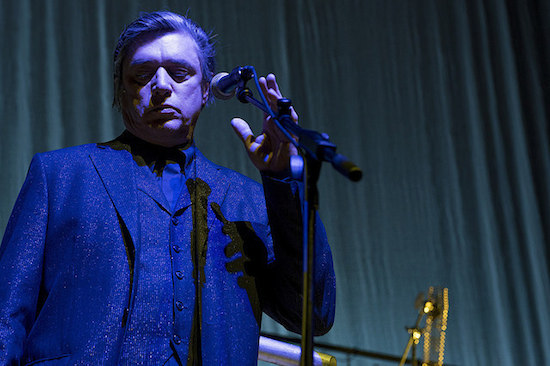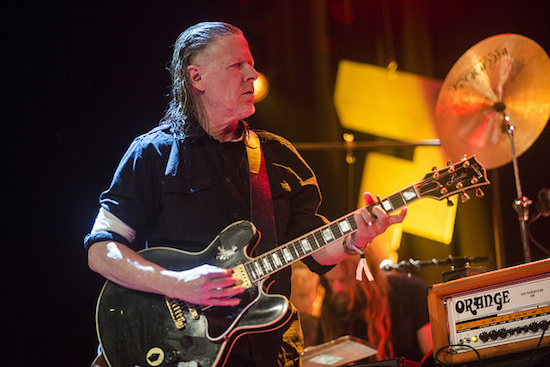Photo by Erik Luyten
Utrecht is certainly the very heartland of Holland in geographical terms but, on the evidence of the mighty Le Guess Who? festival, can this medieval city, compact enough to be thoroughly walkable, yet sufficiently cultured to retain an assuredly urbane air, also be considered the country’s cultural epicentre? Certainly, the vast scale and self-sustaining nature of Le Guess Who? enable pertinent aspects to thrive. You see, there’s a certain relaxed, inclusive, continental open-mindedness to the event, one which ensures a 24-hour Dronefest can co-exist with, say, the Sleaford Mods thrumming out a vicious set of visceral vituperativeness a mere 200 metres away. Of course, one of the beauties of Le Guess Who? is this happy accidental melding of genres; the opportunity for followers of one camp to unexpectedly and enjoyably stray into other genres.
Many years after Marlene Dietrich sang, "Flowers will bloom again/In the ruins of Berlin", the festival’s opening night sees Einstürzende Neubauten headline; when Blixa Bargeld appears dressed as Dietrich and singing the aforementioned ‘Where Have All The Flowers Gone?’, you cannot failed to be entirely overwhelmed by the staggering ambition and all-consuming context of the band’s Lament, commemorating the 100th anniversary of World War I. As much theatre as it is musical performance, the almost-entirely new compositions span the entire career of Neubauten, featuring blasts and shards of aleatoric aggression, mass percussive perambulations and excursions through Americana. What’s even more striking about this event is that it’s often hilariously funny: Alex Hacke hobbling around the stage on amplified crutches and Bargeld consistently berating the hapless sound engineer over the apparent low levels in his monitors, an exchange which oddly fitted in with the event endless display of dramatics. But we are ever reminded of the war context, either though Bargeld’s stage patter, his displaying of placards or the grave solemnity of the sounds pouring out of the accompanying string quartet. Even when the band delve into their ‘archive’ to perform the chronologically apposite ‘Let’s Do It A Dada’, it feels like Neubauten are covering Neubauten, such is the encompassing nature of Lament.
Meanwhile, Saturday night’s headliners arguably maintain an archive of equal immense proportions, albeit incorporating a twelve year or so hiatus. Swans are now some five years into their self-styled ‘rejuvenation’ with the maniacal Michael Gira at the wheel, an enflamed current driving and direct the band’s descent/ascent into all out aural assault. But even musicians like this, who pride themselves on avoiding stylistic norms, can find it rather difficult to avoid having an identifiable ‘sound’. The 2014 edition of Swans certainly fall into this category; while there is a certain amount of improvisation and spontaneity, the band still falls within the same strictures of crashing crescendoes and structured noise. Their re-appearance has now heralded three albums in four years; prolific, yes but is their current output any more challenging than their mid-nineties extemporisations into warped folk and ambient? On the evidence of their set at Le Guess Who?, it seems not. However, this may be due to the company the band are keeping, appearing just after the Savages and Bo Ningen part-improvised ‘simultaneous poetry’ piece. While these two acts engage in striking physical dialogue with one another, the overall effect is somewhat less striking, shooting towards a Glenn Branca style transcendence but falling somewhere short of the mark. While the collaboration promises something new, it ultimately sounds much like any other mélange of freeform guitar noise and feedback.
Nevertheless, elsewhere in Utrecht, something considerably more interesting and even life-affirming is happening: Le Mini Who?, an addendum to the main event, proudly and verbosely showcasing "A substantial part of the Dutch underground and several international acts". Happening in such comparatively off-piste venues as art galleries, dingy garages and minuscule coffee shops, Le Mini Who? is entirely free of the stress and bombast and main stage festival histrionics and instead focuses upon young bands who simply revel in playing live. The pick of the bunch were Yuko Yuko, essentially a vehicle for the ersatz pop muse of Elias Elgersma, who wreathed the audience in smiles with their deconstructed/reconstructed pop excursions; all the fun of kitsch, minus the kitsch. Elias later turned up in another band, The Homesick, whom inexplicably describe themselves as ‘loftpop’ but, to these ears, sound more like an agitated Slowdive. Slightly denser in sound, The Homesick offer a more earnest take on Yuko Yuko’s joyous pop, but no less charming.

Photo by Tim van Veen
Meanwhile, over in The Village Garage, on some side street off the Voorstraat, De Kilko’s are – appropriately – cranking out some manic, frenzied, pop-eyed garage rock. It’s sloppy and shouty and full of short sharp shocks with lyrics about vegans or cigarettes or even vegan cigarettes. The De Kilko’s frontman crucially looks the part: ostensibly mild-mannered and bespectacled, but with a very real sense of impending mania about everything he says and does. This leads us into the very surreal world of Harry Merry, the underground cult legend from Rotterdam who sounds like Harry Merry, only. Merry is utterly immersed in the 1970s, looking like he could be a roadie for Budgie, but full of marginally deranged charm and irreverence. His style of music seems to be entirely dictated by the choices available on his Roland keyboard – rock & roll, rhythm and blues, schlager – but is continually disrupted by these galloping drum machine diskettes which accompany him, sounding like he is continually throwing each of his songs down some rather severe flights of stairs. Of course, he’s magnificent to watch and utterly compelling to listen to, at once mocking and revering the pomp and ceremony of pop music.
Over at the main event, Mac DeMarco may rhapsodise about his songwriting being jokey and rather puerile, but his set at Le Guess Who? is anything but. The Canadian rips through a polished and assured set of Kinks-style sophisti-pop with aplomb, his sweetness an antidote to the noisy sturm und drang populating the rest of Saturday evening’s line-up. This is further upset by the mighty Wire who debuted a new song simply entitled ‘Manchester’ and are simply brilliant throughout, their strength coming from not just experience, but the sense that the band are in constant dialogue with their own material and seamlessly interweaving their more outré excursions with contemporary rock forms.
Such excursions are extended into the realm of infinity with the festival’s much trumpeted 24-hour dronefest. If ambient exists at the outer edges of electronica, whither drone, full of uneasy negotiations between sophisticated sound design and unfiltered noise? A 24-hour dronefest is ambitious nay outlandish in scale and while it offers predictable peaks and troughs – both in performance and audience attendance (participation would be misleading here as engagement was almost entirely liminal) – it also worked, magnificently at times: Tim Hecker opens the proceedings with an uncompromising set, full of all sorts of detritus whipped up into fierce cyclonic patterns around you. In fact, Hecker’s set is only bettered by William Basinski, performing a new piece specifically for the event. Basinski offers up a series of sustained, gorgeous whiteouts, a remarkable exercise in ambient aurora, culminating in a gloriously slow awakening of an electronic dawn. Prior to this, Julianna Barwick beguiled with her Enya-on-ether eerie Pagan poetry while erstwhile-Emeralds man Steve Hauschildt brought a little warmth to the proceedings, his set was full of rare emotion and colour, skimming the more mercurial depths of electronic music. Why does the Dronefest work so well? Well, even if the template was repetitive, the joy really was in the repetition, the saturating sounds establishing a wonderful rapprochement over the course of the twenty four hours, or at least for those hardy enough to withstand the immersion for this length of time.
Sunday night is all about the Anatolian folk legend Selda Bagcan, the famed protest singer jailed for her revolutionary convictions and now undergoing her own belated rejuvenation as an emblem of outspoken, proletariat rage. Without Turkish, a lot of Seldan’s rhetoric is somewhat lost but no matter; her band are steeped in vintage space rock sounds filtered through Anadolu psych. Keyboard whooshes trill through the almost thwarted-funk sounds as Selda exhorts and beseeches her audience – teeming with Turkish fans who travelled especially to see her – to join her call to arms. Accordingly, everyone dances like crazy and the sedate appreciation of the dronefest feels like an entire generation away. This magnificent calibration of such a staggeringly catholic array of artists is certainly key to Le Guess Who?’s success but it’s also the sidebar events such as Le Mini Who? which provide the festival with the (relatively) local groundswell of support and sustainability to warrant a line-up of such scale and expanse. As festivals go, Le Guess Who? is uniquely singular and utterly immense in its vision.
<div class="fb-comments" data-href="http://thequietus.com/articles/16923-festival-report-live-review-le-guess-who” data-width="550">


